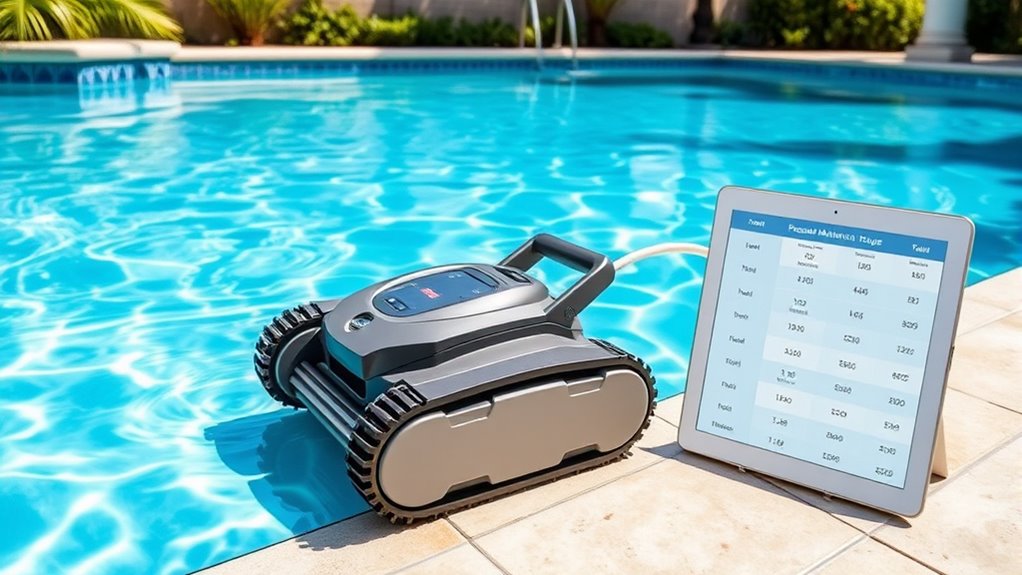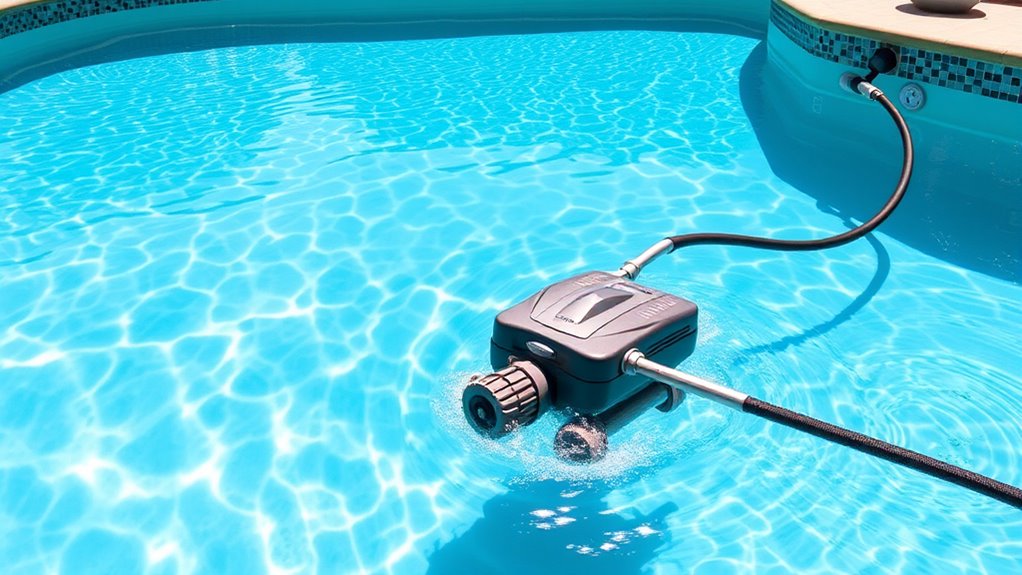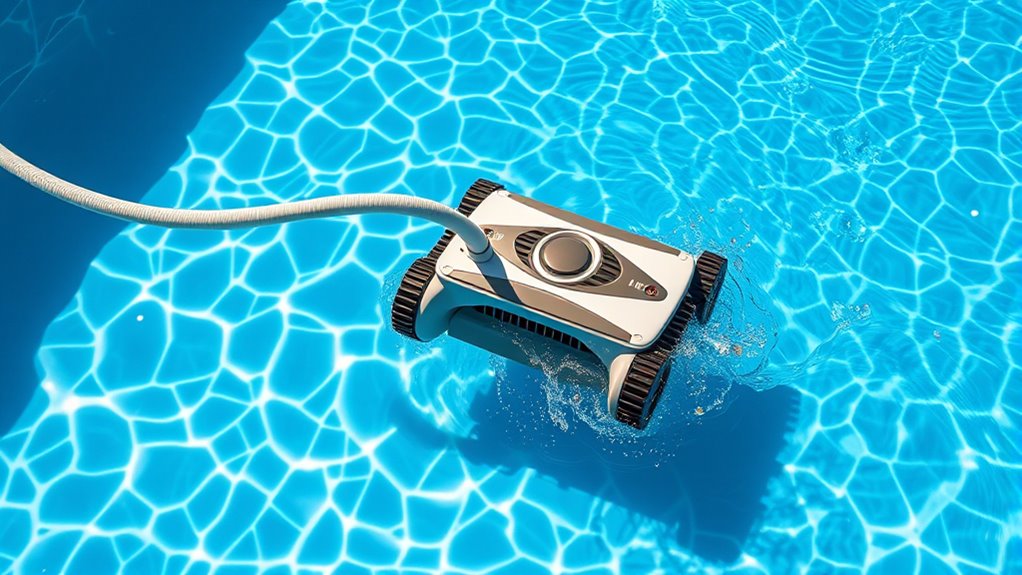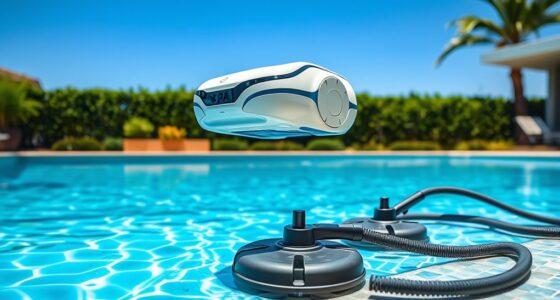You should run your pressure pool cleaner about once a week to keep debris, algae, and dirt at bay, especially during peak seasons or after storms. Factors like pool usage, nearby trees, and weather can influence how often you need to clean. Regular operation helps maintain water clarity, reduces strain on your equipment, and prolongs its lifespan. Want to master your pool maintenance routine? Keep going to find out more tips and tricks.
Key Takeaways
- Run your pressure pool cleaner at least once a week for regular maintenance and debris removal.
- Increase cleaning frequency after storms or heavy wind to prevent debris buildup.
- Adjust cleaning schedule based on pool usage, debris levels, and weather conditions.
- For algae-prone pools, run the cleaner more frequently to maintain water clarity.
- Regularly inspect and maintain the cleaner to ensure optimal performance and prevent clogging.
Factors Influencing Cleaning Frequency

Several factors influence how often you should run your pressure pool cleaner. One key aspect is pool chemistry; if your water’s pH or chlorine levels are off, debris and algae can accumulate faster, requiring more frequent cleaning. Weather conditions also play a significant role—stormy or windy days stir up dirt and leaves, making it necessary to run the cleaner more often. Additionally, if your pool is located near trees or surrounded by vegetation, debris will settle frequently, increasing cleaning needs. Keep an eye on water clarity and debris buildup, adjusting your schedule accordingly. Regularly maintaining proper pool chemistry minimizes algae growth and debris, reducing the need for excessive cleaning. The presence of automated pool cleaning devices can also help maintain cleanliness more efficiently, ensuring your schedule remains effective. Moreover, proper water circulation enhances the efficiency of cleaning routines, helping distribute chemicals evenly and prevent debris accumulation. Overall, understanding these factors helps you determine an effective, personalized cleaning routine.
Recommended Schedules for Different Pool Types

Different types of pools require tailored cleaning schedules to keep them in ideal condition. For inground pools, running your pressure pool cleaner twice a week is usually enough, provided you maintain proper pool chemical balance to prevent algae growth. In saltwater pools, weekly cleaning is often sufficient, but you should check water chemistry regularly to avoid imbalance. Above-ground pools may need cleaning more frequently during peak season, especially if debris accumulates quickly. Don’t forget pool cover maintenance—removing debris from covers helps reduce dirt entering the water, decreasing cleaner workload. Adjust your schedule based on usage, weather, and debris levels, but always prioritize maintaining proper chemical balance. Regular testing of water chemistry can help prevent algae growth and other issues, ensuring a safe and clean swimming environment. Consistent cleaning helps extend your equipment’s lifespan and keeps your pool sparkling.
Signs That Indicate It’s Time to Run Your Cleaner

You should run your pressure pool cleaner as soon as you notice debris or dirt accumulating on the pool floor or walls. This helps prevent pool debris buildup and algae growth. Watch for these signs:
- Visible pool debris floating or settled on the bottom.
- Increased algae spots or slimy patches on the walls.
- Cloudy water that doesn’t clear after filtration.
- Reduced water circulation or uneven cleaning patterns. Regular maintenance and timely cleaning can also extend the lifespan of your equipment and improve overall pool health. Running your cleaner promptly keeps your pool looking pristine and minimizes algae prevention efforts. Proper pool maintenance is essential for a healthy swimming environment. Regularly addressing these signs ensures your pool stays clean and healthy, saving you time and effort in the long run. Don’t wait until debris causes larger problems—act quickly to maintain optimal pool conditions. Additionally, using a pressure pool cleaner efficiently can help distribute cleaning power evenly across the pool surface.
Benefits of Regular Maintenance and Proper Timing

Maintaining a consistent schedule for running your pressure pool cleaner and performing routine maintenance offers clear advantages. Regular cleaning helps keep your pool’s water chemistry in proper balance, preventing algae growth and reducing the need for chemical adjustments. When you stay on top of maintenance, your pool equipment lasts longer, avoiding costly repairs or replacements. Proper timing ensures debris doesn’t accumulate, making your cleaning sessions more effective and less frequent. Additionally, a well-maintained pool reduces strain on the pump and filter systems, saving energy and extending their lifespan. Consistency in cleaning routines also means fewer surprises and a more enjoyable swimming environment. Using a curing method can further enhance the effectiveness of your maintenance routine. Regular inspections of pool equipment can help identify potential issues early, preventing downtime and costly repairs. Developing a preventive maintenance plan ensures that minor issues are addressed before they become major problems, ultimately saving you time and money. Incorporating proper cleaning techniques supported by industry best practices can also improve overall pool health. Adopting a routine schedule helps ensure that your pool remains clean and safe for use throughout the season. Ultimately, investing time in regular maintenance promotes a healthier, safer, and more efficient pool.
Tips for Optimizing Your Pool Cleaning Routine

To enhance your pool cleaning routine, establishing a consistent schedule based on your pool’s usage and environmental factors is essential. Regular checks help maintain a proper pool chemical balance and ensure seasonal pool care. Here are tips to improve your routine:
- Monitor water chemistry weekly to keep chemical balance in check, preventing algae and buildup.
- Adjust cleaning frequency during seasonal pool care, cleaning more often in fall and winter if debris increases.
- Use your pressure pool cleaner regularly, especially after heavy rains or storms, to remove debris promptly.
- Schedule deep cleaning sessions monthly to address areas prone to algae or grime buildup, guaranteeing optimal circulation and cleanliness.
- Incorporate filter performance metrics techniques into your routine to understand how equipment performance influences overall pool maintenance efficiency.
- Be aware of entertainment and parks schedules, such as SeaWorld, Worlds of Fun, Disneyland, and Dutch Wonderland, to plan your pool maintenance around your leisure activities and avoid disruptions.
- Keep an eye on pool equipment, as well-maintained filters and pumps are crucial for effective cleaning and water circulation. Additionally, understanding emotional support can help manage stress related to pool maintenance and other household responsibilities.
Implementing these tips keeps your pool sparkling and reduces long-term maintenance efforts.
Frequently Asked Questions
Can Running the Cleaner Too Often Damage the Pool Equipment?
Running your pressure pool cleaner too often can indeed cause damage to your pool equipment. Overusing it may lead to increased wear and tear, affecting equipment maintenance and potentially causing leaks or malfunctions. Plus, frequent operation boosts energy consumption unnecessarily. To keep your pool in top shape and save energy, run the cleaner only as needed—usually once or twice a week—based on your pool’s size and debris level.
How Does Weather Impact the Frequency of Pressure Pool Cleaner Use?
Weather effects play a big role in determining how often you should run your pressure pool cleaner. During seasons with heavy rain or wind, debris accumulates faster, so you might need to increase cleaning frequency. In calmer, drier weather, seasonal adjustments mean you can reduce cleaning. Keep an eye on weather forecasts and debris levels to avoid overworking your equipment or letting your pool get dirty.
Is There a Recommended Cleaning Schedule for Saltwater Pools?
Did you know that saltwater pools need less chemical balancing? For ideal pool chemistry and algae prevention, you should run your pressure pool cleaner at least once a week during peak season. This helps remove debris, reducing algae growth and maintaining clear water. Adjust frequency based on usage and weather. Regular cleaning ensures your pool stays inviting, clean, and safe, saving you time and effort in the long run.
Should the Cleaner Be Run More Frequently During Peak Swimming Season?
During peak swimming season, you should run your pressure pool cleaner more frequently to maintain ideal pool maintenance. This prevents debris buildup and keeps your water clear, but don’t overuse it, as running it excessively can shorten the cleaner’s lifespan. Adjust your cleaning schedule based on pool usage and weather conditions, ensuring you balance effective cleaning with preserving your equipment’s longevity.
How Do Pool Size and Shape Affect Cleaning Frequency Needs?
Think of your pool as a living canvas, where size and shape influence its breathing space. A larger or uniquely shaped pool gathers debris like a magnet, demanding more frequent cleaning. The pool surface and debris accumulation act as telltale signs, guiding you when to run your pressure pool cleaner. Regular cleaning keeps the water clear and the surface pristine, ensuring your aquatic masterpiece stays inviting all season long.
Conclusion
Think of your pressure pool cleaner as a trusted garden tool—you wouldn’t leave it unused for months. Regularly running your cleaner keeps your pool sparkling and prevents bigger issues later. For most pools, a weekly run is ideal, but pay attention to signs like debris buildup. Just like tending a garden, consistent care saves you time and effort in the long run, ensuring your pool stays inviting all season long.









